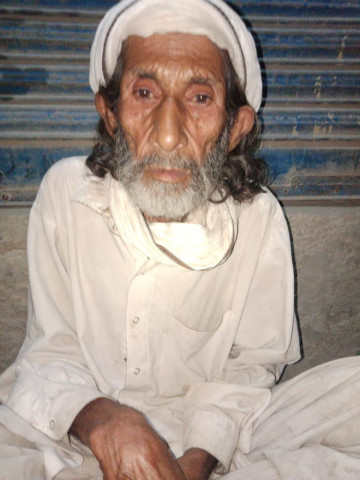Kiln worker famous for penning and reciting noha, marsia
Using the pseudonym ‘Azhar’, Syed Sabz Ali Shah has penned more than 7,000 noha and marsia over 58 years

PHOTO: EXPRESS
Religious gatherings are organised at imambargahs from the beginning of Muharram until Chehlum. The events of Karbala are narrated during these gatherings while marsia and noha, elegies mourning the martyrdom of the Holy Prophet’s (PBUH) grandson, are also recited. The history of these elegies is over 1,400 years old. In Basit Allah Baksh, Jatoi tehsil in Muzzafargarh district, this tradition is kept alive by 80-year-old Syed Sabz Ali Shah.
A labourer at a brick kiln, Shah has been reciting marsia and noha for the past 58 years. Using the pseudonym ‘Azhar’, he has penned more than 7,000 noha. Shah is unable to read or write, which is why he has to commit his elegies to memory until he can find somebody to pen them down.
“I attend majlis and listen to the events of Karabala being narrated. After that I use my own intuition to put these in the form of noha and marsia,” Shah explains. I enjoy collecting dates. Often when I climb down from a tree after plucking the fruit, a noha is ready in my mind, he states.
I used to recite marsia with my late friend Nabi Baksh. He used to write under the pseudonym, ‘Mahir’. He was also illiterate like me and used to sell pakoray and samosay for a living, Shah reminisces.
Shah’s elegies are popular in religious gatherings organised in Kotla Reham Ali Shah, Phullan Shareef, Bilay Wala, Meer Hazan Khan, Shehar Sultan and Muzaffargarh city; young boys from Kotla Reham Ali Shah come to him to as students so that they can learn from him.
Shah does not earn a single penny through his noha and marsia. “I recite these out of love for the Holy Prophet (PBUH) and his family. I also let people who come to me as students jot them down free-of-charge because money is no compensation for the Almighty’s blessings,” he articulates.
To make both ends meet, I work at a brick kiln. Even at this age, I am proud to be a labourer, he says.
Shahid Hussain, one of his students, says that Shah works at the kiln the entire day and in the evening sits down to recite the elegies so that Hussain can write them down. “I have been penning Shah’s works for the past 10 years,” Hussain maintains.
Shamsheer Hussain Jafri, a secondary school teacher at a local government school, has decided to collect Shah’s elegies to compile them in a booklet. “His works are a treasure and have been handwritten by various people. I want to publish them in a book so that coming generations can benefit from it,” he says.



















COMMENTS
Comments are moderated and generally will be posted if they are on-topic and not abusive.
For more information, please see our Comments FAQ